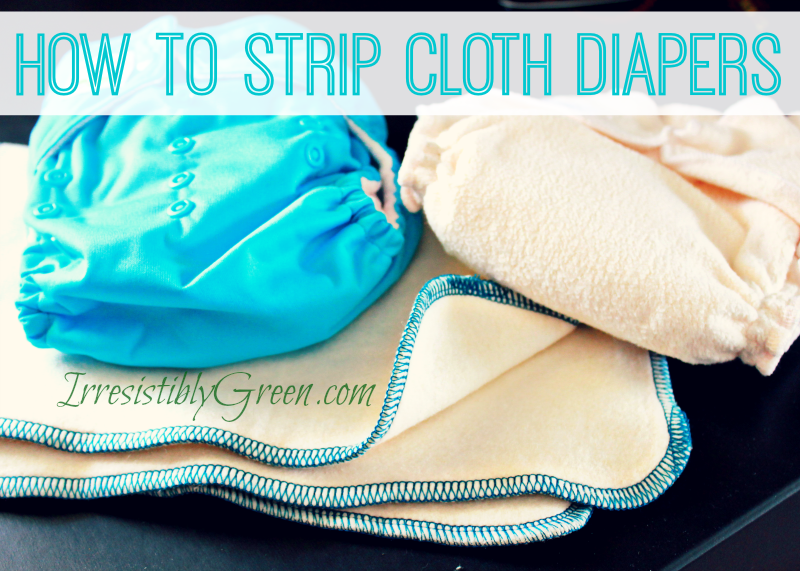
If you are purposefully reading this, then you know why you are here. Your cloth diapers stink. Maybe they stink just a little. Maybe they burn your eyes after a good whiff. Maybe they are letting off a foul barnyard stench worthy of fertilizing a nearby field of alfalfa. Regardless, you want a remedy before your wrap those odorous stink bombs around your baby’s tush again.
There are usually three reasons for diapers to start reeking and ruining that new baby smell:
- Repelling due to odd detergent build up. Sometimes you are just not rinsing enough. And other times, you are using a detergent with a water type that no amount of rinsing will fix. Too much detergent or the wrong type with soft or hard water can be problematic.
- Ammonia build up from not getting clean enough. far too often the cleaning advice in the cloth diapering word was to use an infinitesimal amount of detergent with a ton of water. then, the advice also advocated using natural detergents with no enzymes or stripping agents. What is left is a bunch of cold water with no actual detergent in it. This does not clean urine and fecal buildup that well, hence, stinkage.
- Residue or repelling from a fabric softener or diaper rash cream. Most fabric softener softens by adding a a film of greasy goo on your fabric. it is a thin layer, but a layer all the same. this can build up and cause fabric to no longer absorb fluid. It can also begin trapping impurities and minerals, as well as ammonia, which leads to odors because the fabric is simply not clean. If you get enough fabric softener built up, the detergent cannot penetrate fibers to do its job. This happens with diaper rash creams as well. Event he cloth safe creams can build up with time due to washing in cold water with too little detergent.
So, how do you strip cloth diapers?
- Dawn original dish soap.(Or equivalent.) It strips grease and cuts through build up. Why dawn? It is super concentrated and sticking to one concentrated form keeps it consistent. Palmolive also works. the more natural SLS free types do not work though. Add just a couple drops of Dawn to your washing machine after your have cleaned your diapers. Add the diapers and let the machine run a cycle. Continue running rinse cycles until you see no suds. If you have an obvious visual residue from a cream, you can apply Dawn to the area and brush it lightly with a tooth brush.
- Boiling. You can boil prefolds, flats and inserts to strip. Boiling can release residue and kill bacteria. Do not boil anything with snaps, elastic, or PUL or TPU. Covers and pocket shells should not be boiled. nor should you boil fitteds with elastic. Wash the cloth diapers first, and then boil them for 15 minutes in a large kettle. If suds occur, you may need to empty the pot and refill. The intense heat is usually enough to remove impurities.
- Bleach. Sometimes bacteria and ammonia happen despite our best intentions or washing routine. Hard water and/or an HE washing machine can be the culprits. Plus, sometimes the more natural laundry detergents just do not get the job done. Bleach can be used to strip inserts or it can be used occasionally as a maintenance measure against stink issues. Check with your manufacturer. Bumgenius recommends bleaching once a month, but for some brands it will void your warranty.
- RLR. RLR Laundry Treatment is an unofficial stripper for cloth diapers. It removes minerals from hard water along with detergent build up. It is great for dingy bath towels. It gets whites whiter and colors bright by getting out the funk. If you have hard water you might be getting mineral build up on your diapers causing stink and less absorbency. RLR can be used to clean your washing machine and strip your diaper inserts. Check with your manufacturer first. It is best to use it on the prefolds and inserts but not covers and pocket shells.
- Vinegar. Vinegar can be used as a rinse aide. The acidic nature of vinegar helps rinse out access sodium percarbonate which is a water softener and laundry aide. The harder your water, the more sodium percarbobate (washing soda or soda ash) you need to have in your washing routine. Soda ash is very basic so the acidic vinegar can help neutralize and rinse it out. This may involve some trial and error to see if it helps and in what amounts for your water hardness and washing routine. The catch-22 of using vinegar is when you use it in hard water, it could actually be the cause of your stink instead of being a remedy. This is where the trial and error really comes in handy. Not all water is hard in the same way. Iron is different from lime, and so on.
If you find yourself needing to strip diapers more than just a few times per year, then it is time to troubleshoot your routine. Look into liners if you use diaper creams. Try washing in hot water if you wash in cold. many parents find they need to switch to a stronger detergent. The “green” detergents are a nice idea, but are not always optimal when it comes ot heavily soiled items. Especially in our age of energy efficient washing machines.

